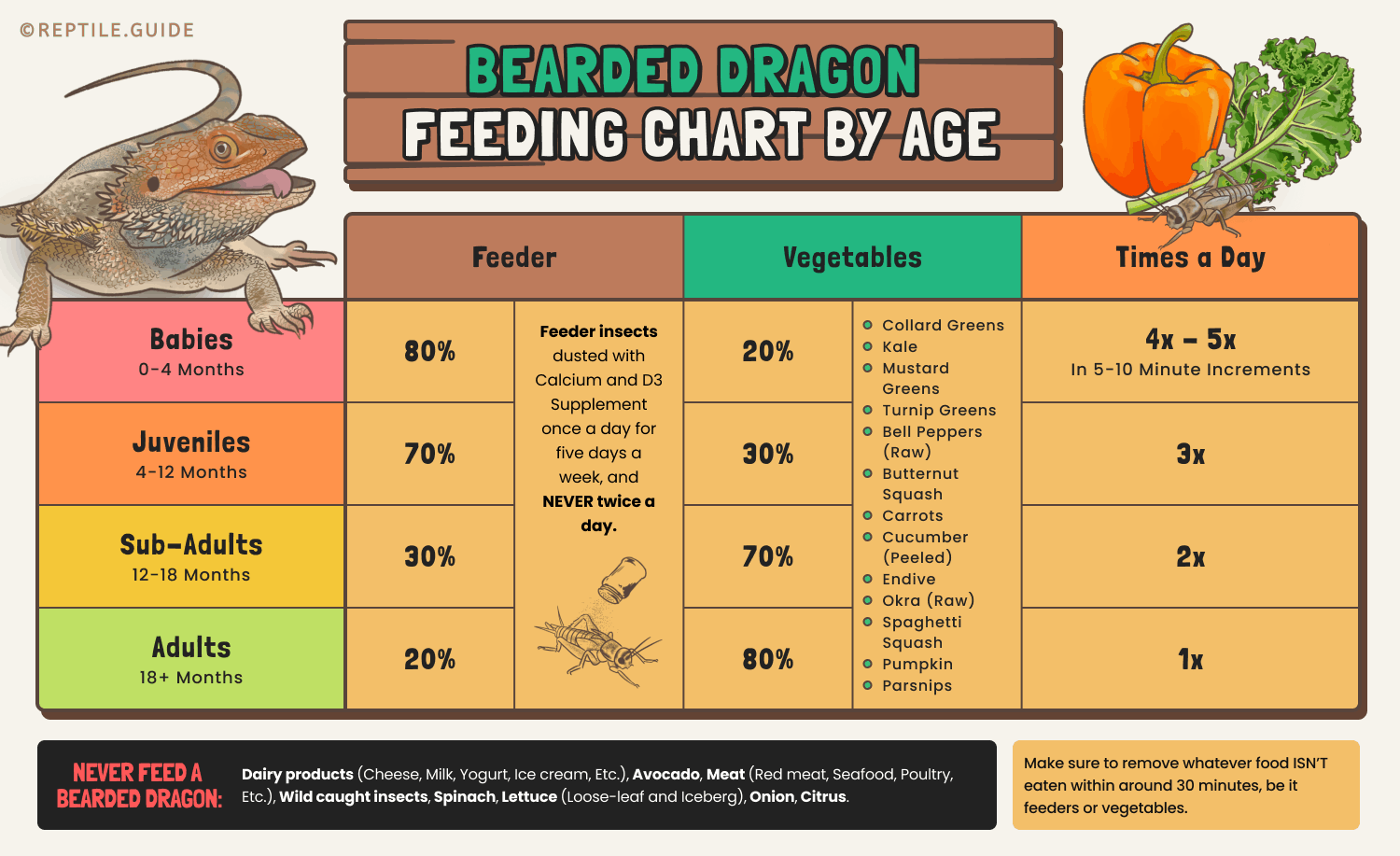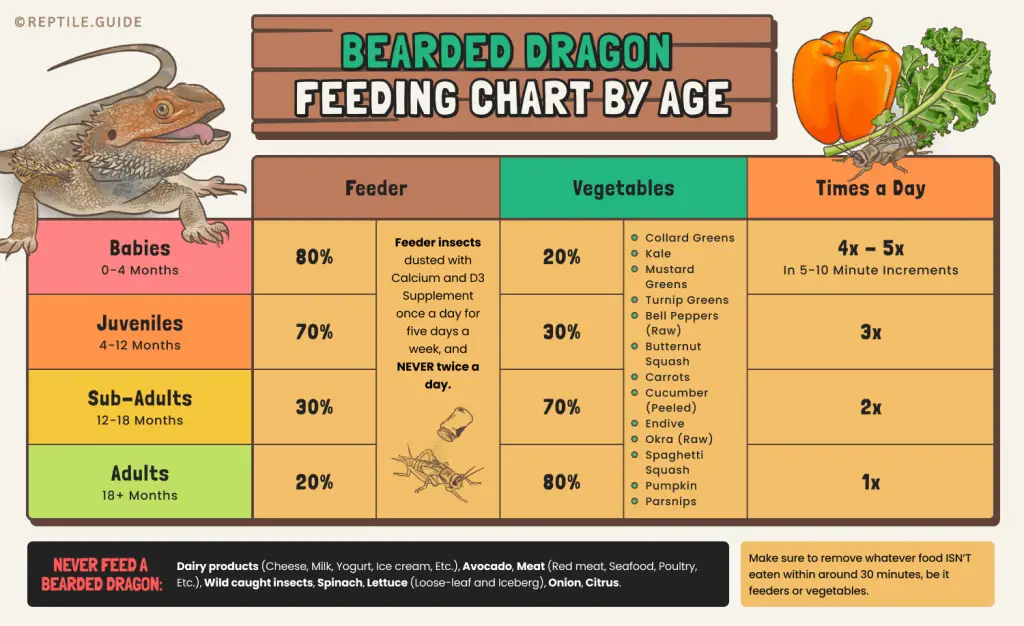Bearded dragons are popular pets because of their docile nature and unique appearance. However, as with any pet, proper care is essential to ensure their health and well-being. One crucial aspect of caring for bearded dragons is their diet, which needs to be carefully balanced and varied to meet their nutritional needs.
In this bearded dragon feeding guide, we will cover everything you need to know about feeding your pet, including the types of food they need, how often to feed them, and how to create a balanced diet. Whether you’re a new or experienced bearded dragon owner, this guide will help you ensure that your pet is getting the nutrition they need to thrive. So, let’s dive in!
Feeding your bearded dragon involves providing a balanced diet of insects, vegetables, and fruits. Offer crickets, mealworms, and dubia roaches as protein sources, while collard greens, kale, and butternut squash can provide necessary vitamins and minerals. Avoid feeding your bearded dragon spinach, avocado, and rhubarb as they are toxic. Offer a small amount of food daily and adjust the quantity based on your pet’s appetite and weight.

Bearded Dragon Feeding Guide: A Comprehensive Guide to Feeding Your Bearded Dragon
Bearded dragons are fascinating pets that are relatively easy to care for and make great companions. One of the most important aspects of caring for a bearded dragon is ensuring they are receiving a proper diet. In this article, we’ll provide you with a comprehensive guide to feeding your bearded dragon, including what to feed them, how much to feed them, and when to feed them.
What to Feed Your Bearded Dragon
Bearded dragons are omnivores, which means they eat both plants and animals. A balanced diet for a bearded dragon should consist of both animal protein and plant matter. The best types of animal protein to feed your bearded dragon are insects and worms. Some good options include crickets, mealworms, and waxworms. It’s important to note that not all insects are safe for bearded dragons to eat, so do your research before feeding your pet any new types of insects.
In addition to insects, bearded dragons also need to eat plant matter. Some good options include dark leafy greens, such as kale, collard greens, and mustard greens. Vegetables like carrots, sweet potatoes, and butternut squash can also be fed to bearded dragons. Fruits should be given in moderation due to their high sugar content. Some good options include strawberries, blueberries, and mangoes.
How Much to Feed Your Bearded Dragon
The amount of food your bearded dragon needs will depend on their age, size, and activity level. Baby bearded dragons should be fed more frequently than adult bearded dragons. Generally, baby bearded dragons should be fed two to three times a day, while adult bearded dragons can be fed once a day.
It’s important not to overfeed your bearded dragon, as obesity can lead to health problems. A good rule of thumb is to feed your bearded dragon as much as they can eat in 15 minutes. If there is still food left over after 15 minutes, remove it from their enclosure.
When to Feed Your Bearded Dragon
Bearded dragons are diurnal, which means they are active during the day and sleep at night. It’s best to feed your bearded dragon during the day when they are most active. Feeding your bearded dragon in the evening can disrupt their sleep schedule.
Benefits of Feeding Your Bearded Dragon a Balanced Diet
Feeding your bearded dragon a balanced diet has numerous benefits. A diet that consists of both animal protein and plant matter will help ensure that your bearded dragon is getting all the nutrients they need to stay healthy. A balanced diet will also help prevent health problems, such as obesity and malnutrition.
Feeding Your Bearded Dragon Live Insects Vs. Pre-killed Insects
Some pet owners prefer to feed their bearded dragons live insects, while others prefer to feed them pre-killed insects. There are pros and cons to both methods. Live insects are more natural for bearded dragons to hunt, which can provide mental stimulation and enrichment. However, live insects can also be more difficult to store and may be more expensive. Pre-killed insects are easier to store and are often less expensive, but they do not provide the same level of mental stimulation as live insects.
Supplementing Your Bearded Dragon’s Diet
In addition to a balanced diet, it’s important to supplement your bearded dragon’s diet with calcium and vitamin D3. Calcium is important for bone health, while vitamin D3 helps the body absorb calcium. You can purchase calcium and vitamin D3 supplements at most pet stores. Be sure to follow the instructions on the package carefully, as over-supplementing can be harmful to your bearded dragon.
Common Feeding Mistakes to Avoid
When feeding your bearded dragon, there are some common mistakes to avoid. One of the biggest mistakes is feeding your bearded dragon too much. Overfeeding can lead to obesity and health problems. Another mistake is feeding your bearded dragon the wrong types of insects or plants. Be sure to do your research before introducing new foods to your bearded dragon’s diet.
Conclusion
Feeding your bearded dragon a balanced diet is essential for their health and wellbeing. A diet that consists of both animal protein and plant matter will help ensure that your bearded dragon is getting all the nutrients they need to stay healthy. By following the tips and guidelines outlined in this article, you can provide your bearded dragon with a nutritious and satisfying diet.
Frequently Asked Questions
In this section, you will find some of the most common questions about the bearded dragon feeding guide.
1. What should I feed my bearded dragon?
Bearded dragons are omnivores, which means they eat both plants and animals. A balanced diet for a bearded dragon should consist of leafy greens, vegetables, and fruits, as well as live insects such as crickets, mealworms, and dubia roaches. It is important to offer a variety of foods to ensure that your bearded dragon is getting all the nutrients it needs.
When feeding your bearded dragon, make sure to provide fresh, clean water at all times. You can also mist their food with water to help with digestion. Avoid feeding your bearded dragon wild-caught insects or plants, as they may contain harmful pesticides or parasites.
2. How often should I feed my bearded dragon?
The frequency of feeding your bearded dragon depends on its age. Young bearded dragons should be fed 2-3 times a day, while adults can be fed once a day or every other day. It is important not to overfeed your bearded dragon, as obesity can lead to health problems. A good rule of thumb is to offer as much food as your bearded dragon can eat in 10-15 minutes.
Another important thing to keep in mind is to provide proper lighting and heating for your bearded dragon. Without proper lighting and heating, they may not be able to digest their food properly, leading to health problems.
3. Can I feed my bearded dragon fruits and vegetables?
Yes, bearded dragons can eat a variety of fruits and vegetables. Some good options include collard greens, turnip greens, mustard greens, kale, squash, carrots, and berries. However, it is important to avoid feeding your bearded dragon fruits and vegetables that are high in oxalates, such as spinach and rhubarb, as they can bind to calcium and cause health problems.
When feeding your bearded dragon fruits and vegetables, make sure to chop them up into small pieces and remove any uneaten food after a few hours to prevent spoilage and bacterial growth.
4. Can I feed my bearded dragon live insects?
Yes, live insects are an important part of a bearded dragon’s diet. Some good options include crickets, mealworms, dubia roaches, and superworms. Avoid feeding your bearded dragon wild-caught insects, as they may contain harmful pesticides or parasites.
It is important to gut-load your insects before feeding them to your bearded dragon. This means feeding them nutrient-rich foods, such as fresh fruits and vegetables, to ensure that your bearded dragon is getting all the necessary nutrients. You can also dust your insects with calcium and vitamin D3 supplements to ensure that your bearded dragon is getting enough of these essential nutrients.
5. What are some common feeding problems with bearded dragons?
One common feeding problem with bearded dragons is impaction, which occurs when they ingest something they can’t digest, such as substrate or large pieces of food. To prevent impaction, make sure to provide a proper substrate, such as reptile carpet or paper towels, and chop up your bearded dragon’s food into small pieces.
Another common feeding problem is overfeeding, which can lead to obesity and health problems. Make sure to offer as much food as your bearded dragon can eat in 10-15 minutes, and adjust the amount as needed based on its age and activity level.
In conclusion, feeding your bearded dragon is an essential aspect of its care that must not be overlooked. By following the bearded dragon feeding guide, you can ensure that your pet receives the appropriate nutrients and stays healthy and happy.
Remember to provide a balanced diet of insects, vegetables, and fruits while avoiding foods that are toxic to your pet. Take note of your bearded dragon’s appetite, behavior, and overall health, as these can indicate whether your pet is getting the right amount of food.
Finally, be sure to consult your veterinarian if you have any concerns about your bearded dragon’s feeding habits or health. With proper care and attention, your bearded dragon can live a long and fulfilling life as your beloved pet.

